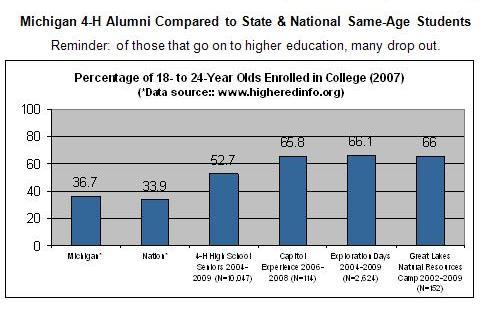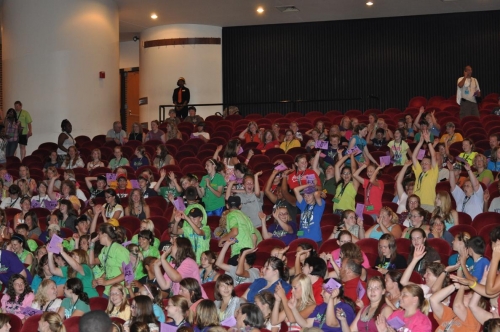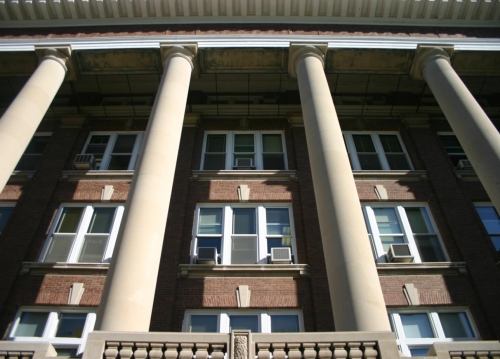Michigan 4-H does make a difference!
In a 2007 study by the National Center for Higher Education, Michigan 4-H high school and pre-college students-especially those involved in pre-college programs-attend college more often than their same-age state and national peers.


The following is a snapshot of the situation for today’s teens:
-Youth need access to programs that expand their horizons, allow personal growth and encourage career
exploration.
-According to the Alliance for Excellent Education (July, 2009), the skills to succeed in college, the military or the workplace are essential, yet our youth are largely unprepared.
-Ninety percent of the highest-paying jobs today require some post-secondary education—also according to the Alliance for Excellent Education.
-Michigan high school graduates are less likely to enroll and remain in college than their peers in other states, according to the National Center for Public Policy and Higher Education’s “Measuring Up 2008: National Report Card on Higher Education.”
Michigan 4-H addresses these challenges by helping prepare youth for a successful transition to adulthood, both academically and socially. In a 2007 study by the National Center for Higher Education, Michigan 4-H high school and pre-college students—especially those involved in pre-college programs—attend college more often than their same-age state and national peers. (See table on page 3.)
A follow-up study that year assessed the 4-H pre-college program’s impact on students’ transition to
college. Researchers sent a web-based survey approved by the MSU Institutional Review Board to the program’s 451 undergraduate alumni. Twenty-eight percent responded. The survey’s key findings are:
-4-H pre-college programs (Exploration Days, Great Lakes Natural Resources Camp and Capitol
Experience) create a pathway to college and workforce success.
-Not only are 4-H pre-college program alumni more likely to enroll in college, they’re more likely to stay in college.
-More than 85 percent of 4-H pre-college program alumni attending college said their 4-H experience
improved their leadership, communication and decision-making skills, as well as their sense of responsibility.
-As college students, they were more likely than their peers to have a 3.0 grade point
average or higher.
 Of those who took the survey, 54 percent completed the open-ended question, “How did your involvement in 4-H contribute to the person you are today?” Here are some examples of their heartwarming testimonials:
Of those who took the survey, 54 percent completed the open-ended question, “How did your involvement in 4-H contribute to the person you are today?” Here are some examples of their heartwarming testimonials:
Pre-College Program Comments:
-“In every way...I am more prepared to enter the work force because of my involvement and skills developed in 4-H. Participation in State Awards, Communication Days, Kettunen Center workshops,
National 4-H Congress, Exploration Days, etc. all helped to teach me skills that I will keep forever.”
-“Exploration Days gave me my first glimpse of MSU and helped me pick my career goal of being an environmental lawyer. It also taught me a great deal about time management skills and responsibility.”
-“Being a member of 4-H definitely increased my leadership skills. I was never a very good leader until I attended the Great Lakes Natural Resources Camp.”
-“Being part of Exploration Days was always a treat. I met people from different ethnicities and lifestyles and was ranted the opportunity to learn.”
-“Through Capitol Experience I learned more about my government than I could ever learn sitting in a classroom.”
Life-Skill Development Comments:
-“4-H helped me to communicate, be responsible and set high standards for myself.”
-“4-H gave me a lot of confidence and the motivation to accomplish huge tasks. It made me feel like I could achieve anything I set my mind to.”
-“I’m more accomplished in the classroom and extracurricular activities, and am an outgoing leader because of 4-H. I’m pursuing a career in veterinary medicine because of 4-H.”
-“4-H allowed me to be comfortable with socializing with a range of people, improved my 'personal self-image and has given me leadership abilities and opportunities.”
-“It led me to my current major and future profession. It also helped me to become more independent, a stronger leader, and a better communicator.”
-“4-H taught me self-control, how to become more independent, and to set high standards for myself.”
Two research-based tenets provide the foundation for 4-H pre-college programs:
Youth Development Research
-Michigan 4-H’s seven Guiding Principles reflect how national research and practical knowledge define
positive youth development.
-Programs that promote critical thinking skills should also provide opportunities for youth to apply those skills.
-There is a correlation between basic knowledge and attitudes.
Experiential Education Research
-Learning and deriving meaning from direct experience.
Outcomes for youth attending these fun and educational 4-H pre-college programs:
-Exposure to a broad scope of programs, resources and activities.
-Skills for planning, carrying out, and reflecting upon goals.
-Knowledge gain, including academic learning skills.
-Personal growth in responsibility, independence, accountability, problem-solving, decision-making, and time management.
-Increased confidence, communication, team work, citizenship, and leadership skills.
-Greater ability to make new friends, particularly those from different backgrounds.
-In-depth training led by content and youth development experts.
-Discovery of career interests and opportunity to explore college possibilities.
By expanding the horizons of middle and high school-age youth, fostering personal growth, and providing college and career exploration, Michigan 4-H is genuinely transforming lives of young people across our state.



 Print
Print Email
Email
